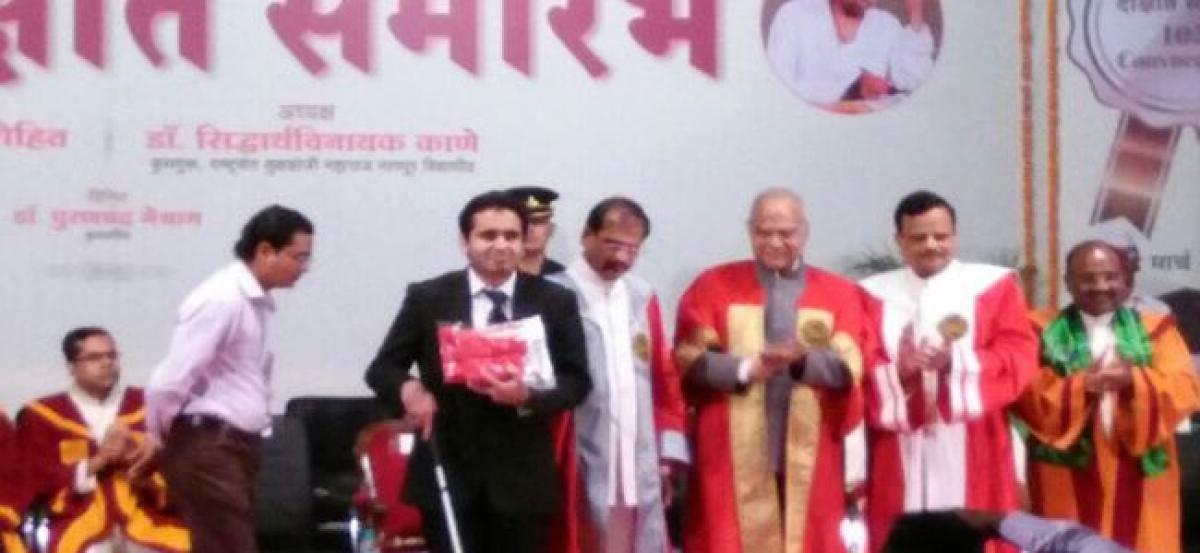Live
- Govt plans to establish offshore Johns Hopkins University Campus in India
- Goa Aces clinch Indian Racing League title
- Study finds how hormone therapy can reshape the skeleton
- High-street fashion players looking at India for manufacturing: Report
- Shreyas Iyer to lead Mumbai as Prithvi Shaw returns for Syed Mushtaq Ali Trophy
- 'Failed to resolve crisis': NPP withdraws support from BJP govt in Manipur
- Chennai: Actress Kasturi Remanded in Custody Until 29th of This Month
- Aaqib Javed likely to become Pakistan's new white-ball head coach
- BJP panel to draft poll charge sheet against AAP govt in Delhi
- Allu Arjun Thanks Fans in Patna, Teases 'Pushpa 2' Release
Just In

Rahul Bajaj, a visually disabled student of the 5-year LLB course in Dr Ambedkar College here, was conferred 20 awards, including 13 gold medals, at the 105th convocation of Rashtrasant Tukadoji Maharaj Nagpur University (RTMNU) here on Saturday.
Nagpur: Rahul Bajaj, a visually disabled student of the 5-year LLB course in Dr Ambedkar College here, was conferred 20 awards, including 13 gold medals, at the 105th convocation of Rashtrasant Tukadoji Maharaj Nagpur University (RTMNU) here on Saturday.
Bajaj stood first in the RTMNU among students of all streams and was presented the medals by Tamil Nadu Governor Banwarilal Purohit at a ceremony here. Bajaj, possibly the first disabled student from the country to have been chosen for the Rhodes scholarship, will be pursuing Bachelor of Civil Law and M.Phil from Oxford University.
Speaking to PTI after the ceremony, Bajaj, currently working in a top law firm in Delhi and having interned under Supreme Court and High Court judges, said the awards were a recognition of the effort he had put in over five years at his course.
Explaining why he chose law as a career, Bajaj said," It is a confluence of three or four factors. I was interested in social studies and English, both of which are central tools for a lawyer. Secondly I have a knack for arguments, in a constructive way, and the ability to put forward my view in a persuasive way."
"Thirdly, as a person with disability, I felt law to be more accessible as skills needed for it are mental and intellectual rather than physical or visual," he explained.
Attributing his success to discipline and consistency, Bajaj said that taking up the challenge of going out of his comfort zone and interning with SC and HC judges gave him the skills to compete at his best at the national level.
Speaking about his Rhodes scholarship, Bajaj said achieving it needed more than just academic accomplishments as the requirement for the scholarship included having a holistic and well-rounded profile.
Bajaj, in the next few months, would be proceeding to Oxford University for his BCL and M.Phil and then plans to litigate on streams like intellectual property rights and constitutional law. He credited a software called "Screen Reader" for the help he got in his studies as it allowed him to hear the words written on a computer screen.
"It really opened up a new world of possibilities for me. I could access the internet and also books. Similarly, I could take the service of writers which was also a challenge in terms of coordination and compatibility," he said. He said that technology had made things easier for the disabled but there was still more that had to be done.
"Now it has become little easier for someone with disability when compared to 20 years ago. However, lack of infrastructure and an attitudinal barrier still exists," he said. Sharing his opinion on how the disabled should be treated, Bajaj said that words like "divyang" (the government's term for the disabled), differently abled and specially abled should not be used as it led to "otherisation" and "alienated" them.
"They should be treated as equals. In India the problem is that there are resource constraints," he said. Citing an example, Bajaj said that while interning with SC Judge UU Lalit, there was no system in place to ensure that he could perform the duties that a law clerk was supposed to do including accessing files. "It was my good fortune that the Judge under whom I was interning was very forthcoming and supportive and took extra efforts for me," he said.
Emphasising on the importance of infrastructure for the disabled, he said that physicist Stephen Hawking could not visit the Taj Mahal in Agra as the monument did not have a ramp for disabled visitors. He credited his success to the support of people around him, especially his father, Sunil, a paediatrician, his mother, Kajal, a homemaker, and his sister who is a gynaecologist.

© 2024 Hyderabad Media House Limited/The Hans India. All rights reserved. Powered by hocalwire.com







